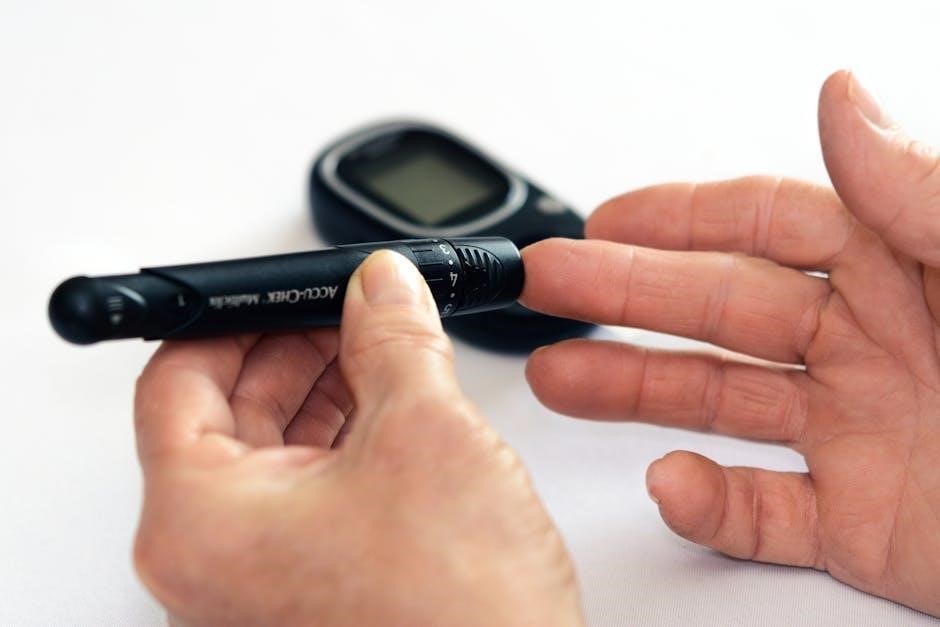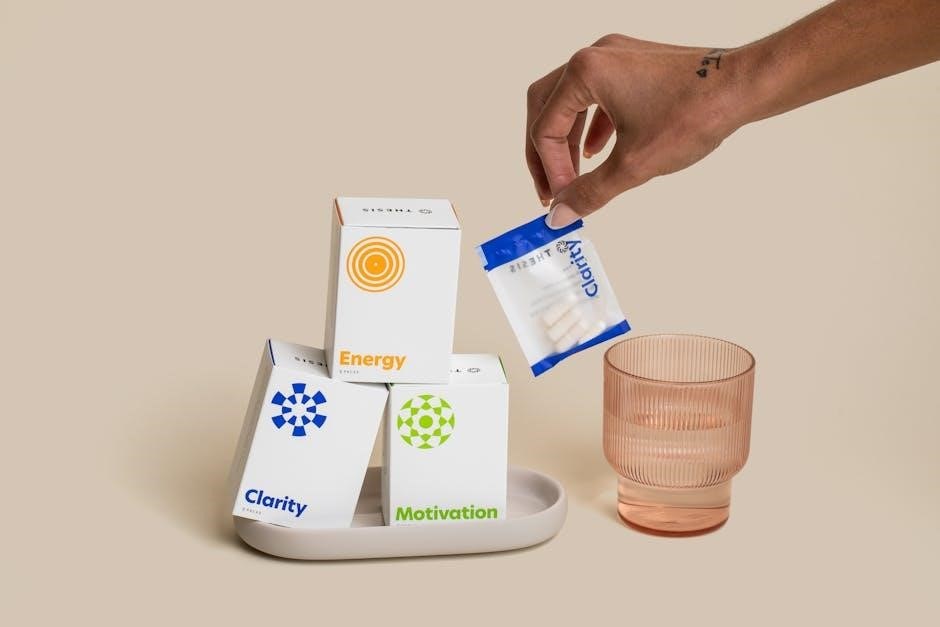daily mental health check in pdf
Summary
Enhance your daily routine with our free mental health check-in PDF. Track your well-being, reduce stress, and cultivate mindfulness with this easy-to-use resource.

Introducing daily mental health check-ins as a simple yet powerful practice to assess emotional well-being. These structured tools help foster self-awareness and proactive mental health management, ensuring long-term well-being.
1.1 What is a Daily Mental Health Check-In?
A daily mental health check-in is a structured practice designed to assess and reflect on your emotional well-being. It involves using tools like PDF worksheets or digital apps to evaluate your mental state, identify emotions, and track progress. This practice helps individuals acknowledge their feelings, set goals, and develop actionable steps for improvement. Regular check-ins provide a clear snapshot of mental health, fostering self-awareness and personal growth. By incorporating this habit, individuals can better understand their needs and cultivate healthy coping strategies, leading to enhanced emotional resilience and overall well-being.
1.2 Importance of Regular Mental Health Assessments
Regular mental health assessments are crucial for maintaining emotional well-being and addressing challenges early. These check-ins provide insights into your emotional state, helping you identify patterns and triggers. By fostering self-awareness, they enable proactive steps to manage stress and improve coping skills. Regular assessments also promote personal growth, allowing you to reflect on progress and set meaningful goals. They offer accountability and motivation, ensuring consistent focus on mental health. Ultimately, regular check-ins are a cornerstone of holistic well-being, empowering individuals to navigate life’s challenges with resilience and clarity.

Benefits of Incorporating a Daily Mental Health Check-In
Incorporating daily mental health check-ins enhances self-awareness, emotional clarity, and coping skills. They foster early detection of challenges, improve emotional regulation, and promote long-term well-being and personal growth.
2.1 Increased Self-Awareness and Emotional Clarity
Daily mental health check-ins enhance self-awareness by helping individuals identify and understand their emotions. This practice fosters emotional clarity, allowing people to recognize patterns, triggers, and strengths. By regularly assessing their mental state, individuals can better navigate complex emotions, leading to improved decision-making and personal growth. These check-ins also encourage reflection on past experiences, enabling individuals to learn from challenges and develop healthier emotional responses over time. Greater self-awareness empowers individuals to address issues proactively, promoting emotional balance and resilience in everyday life.
2.2 Early Detection of Mental Health Challenges

Daily mental health check-ins facilitate the early detection of emotional shifts and potential challenges. By regularly assessing your mental state, you can identify subtle changes in emotions or thoughts that may indicate underlying issues. This proactive approach allows for timely interventions, preventing minor concerns from escalating into more severe problems. Early detection empowers individuals to address challenges before they impact daily life, fostering better mental health outcomes and overall well-being. Regular check-ins create a safety net, helping to identify signs of stress, anxiety, or other conditions early on, when they are easier to manage.
2.3 Improved Emotional Regulation and Coping Skills

Daily mental health check-ins enhance emotional regulation by helping individuals identify and manage their feelings more effectively. Regular self-assessment allows for better recognition of emotional patterns, enabling proactive responses to stress or negativity. Over time, this practice fosters resilience and equips individuals with healthier coping strategies. By addressing emotions early, daily check-ins empower people to navigate challenges with greater ease, reducing emotional overwhelm and promoting a balanced mental state. This consistent practice strengthens emotional intelligence, leading to improved overall well-being and life satisfaction.

How to Perform a Daily Mental Health Check-In
Performing a daily mental health check-in involves using effective tools like worksheets or apps to reflect on emotions, thoughts, and behaviors. This structured practice helps identify patterns, set goals, and address stressors early, fostering consistency and mindfulness in mental health management.
3.1 Step-by-Step Guide to Effective Check-Ins
Begin by setting a clear intention to prioritize your mental health. Start with a mindfulness moment, such as deep breathing, to center yourself.
Assess your emotional state by rating your feelings on a scale of 1-10 and identifying specific emotions like joy, stress, or calm.
Reflect on potential triggers or positive experiences from the day, noting how they impacted your well-being.
Evaluate your self-care habits, ensuring you’ve met basic needs like hydration, nutrition, and sleep.
Identify one actionable step to improve your mental health, such as journaling or connecting with a friend.
Document your insights in a daily mental health check-in PDF or app to track progress over time.
End with a brief reflection on gratitude or goals for the next day.
3.2 Tools and Resources for Structured Assessments
Utilize daily mental health check-in PDFs and digital apps like Symple or The Headway Project’s worksheet for organized reflections.
These tools offer structured prompts and space for documenting emotions, triggers, and self-care habits.
Printable templates provide a tangible way to track progress, while apps like Health on iPhone enable standardized assessments.
Check-in questions and mindfulness exercises within these resources foster emotional clarity and proactive mental health management.
Combining these tools with a consistent routine ensures comprehensive and actionable insights for improved well-being.

Effective Questions for Daily Mental Health Check-Ins
Discover effective questions for daily mental health check-ins, designed to explore emotional well-being for both adults and children. Tools like PDF worksheets and structured prompts help identify feelings, triggers, and goals, fostering clarity and growth.
4.1 Questions for Adults: Assessing Emotional and Mental Well-being
Engage adults with thought-provoking questions to evaluate their emotional and mental well-being. Examples include: “How would you rate your emotional state today?” “What challenges are you currently facing?” “How are you managing stress or difficult emotions?” “What small steps can you take to improve your mental health?” and “What support systems do you have in place?” These questions encourage self-reflection, helping adults identify patterns, strengths, and areas for growth. Tools like PDF worksheets and digital apps provide structured formats for documenting responses, fostering accountability and progress over time.
4.2 Questions for Children: Supporting Their Emotional Growth
Help children express their feelings with simple, age-appropriate questions. Examples include: “How did you feel today?” “What made you happy?” “Was there something that upset you?” “What can we do to help you feel better?” and “What are you looking forward to tomorrow?” These questions encourage open communication and emotional exploration. Using visual aids like emojis or pictures can make it easier for younger children to share their feelings. Regular check-ins foster trust and support their emotional development, helping them build healthy coping strategies and self-awareness from an early age.
Tips for Making Daily Mental Health Check-Ins a Habit
Consistency is key. Start with a simple routine, using tools like printable PDFs or apps to guide your check-ins. Small, mindful steps lead to lasting habits and better well-being over time.
5.1 Creating a Consistent Routine
Establishing a consistent routine is essential for making daily mental health check-ins a sustainable habit. Choose a specific time each day, such as first thing in the morning or before bed, to reflect on your emotional state. Use tools like a daily mental health check-in PDF or a mobile app to guide your process. Incorporate this practice into your daily schedule, ensuring it becomes as automatic as brushing your teeth. Consistency helps build self-awareness and fosters proactive management of stress and emotions, leading to improved long-term well-being.
5.2 Using Printable PDF Worksheets and Digital Apps

Printable PDF worksheets and digital apps are invaluable tools for maintaining structured daily mental health check-ins. PDFs offer a tangible way to document emotions, thoughts, and progress, while digital apps provide convenience and reminders. Many apps include customizable templates, mood trackers, and guided questions to enhance self-reflection. These resources help create a consistent routine and serve as visual reminders to prioritize mental well-being. By leveraging both formats, individuals can choose the method that best suits their lifestyle, ensuring long-term engagement and effective self-care practices.
Daily mental health check-ins foster emotional clarity, personal growth, and proactive well-being. By prioritizing these practices, individuals cultivate resilience and improve their overall quality of life consistently.

6.1 Long-Term Benefits for Overall Well-being

Regular daily mental health check-ins offer profound long-term benefits, fostering emotional clarity, personal growth, and improved mental health management. By consistently assessing emotional states, individuals can identify patterns, address challenges early, and build resilience. These practices enhance self-awareness, enabling better decision-making and stress management. Over time, they contribute to a balanced lifestyle, stronger relationships, and a greater sense of overall well-being. Incorporating tools like checklists or journals further supports these benefits, helping individuals track progress and reflect on their mental health journey for sustained improvement.

6.2 Encouraging Others to Adopt the Practice
Encouraging others to embrace daily mental health check-ins fosters a supportive environment, promoting collective well-being. Leading by example and sharing personal benefits can inspire others to adopt the practice. Providing accessible resources, such as PDF worksheets or apps, simplifies the process. Creating a safe, non-judgmental space for open conversations about mental health further encourages participation. By normalizing these check-ins, we cultivate empathy and understanding, empowering individuals to prioritize their mental health. This collective effort can lead to meaningful, long-term positive change in both personal and societal well-being.